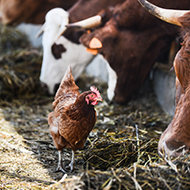Case definition published for avian flu in cattle

The UK government has said that it is monitoring the situation in the USA.
The UK’s Animal and Plant Health Agency (APHA) has updated its case definition and diagnostic testing criteria for highly pathogenic avian influenza (H5N1) in mammals, following the spread of the virus among dairy cattle in the USA.
A new suspect case definition has been added for cattle, sheep, goats and pigs. The criteria include the animal being on a farm, or near a location, where avian flu has been detected, and, for dairy animals, a sudden unexplained drop in herd level milk production.
Since March 2024, several cases of avian flu have been detected in cattle herds in the USA. So far, it has been confirmed in nine states. Cattle being transported between states are now being tested for the virus.
In April, the US Department of Agriculture stated that evidence suggested that cattle-to-cattle transmission was taking place.
Although there is currently no evidence of the virus affecting cattle in the UK, the UK government has said that it is taking the outbreak in the USA very seriously. The new case definition will help APHA to monitor, triage and, when necessary, test any report cases that arise.
A government spokesperson said: “We are monitoring reports of highly pathogenic avian influenza (H5N1) identified in dairy cattle in the USA and are working closely with international counterparts to better understand the virus strain associated with these cases.
“This does not change the risk level for animals in the UK, which is currently ‘low’ and we have no reason to suspect the virus is circulating in our cattle and nor is this virus strain circulating in Europe.”
Image © Shutterstock



 The Federation of Independent Veterinary Practices (FIVP) has announced a third season of its podcast, Practice Matters.
The Federation of Independent Veterinary Practices (FIVP) has announced a third season of its podcast, Practice Matters.